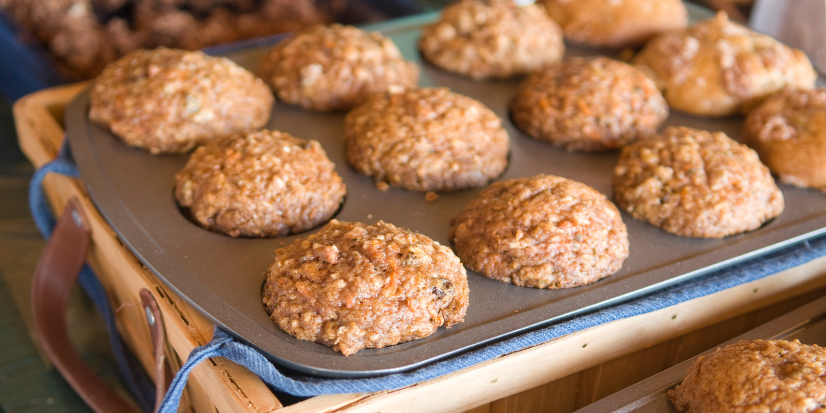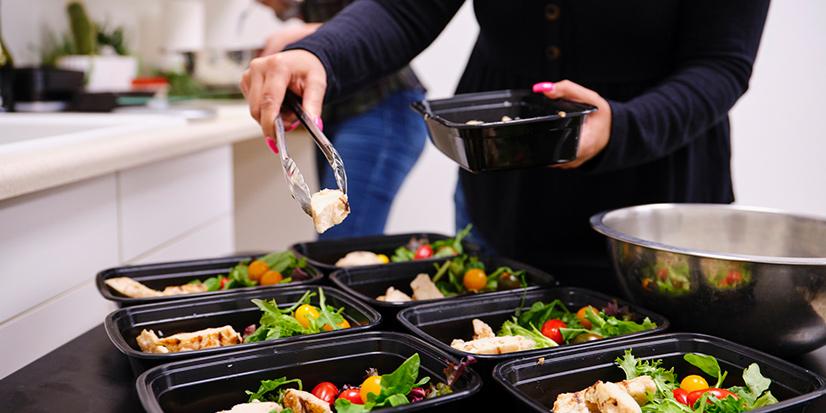Whether it’s your first race or you’ve done so many you’ve lost count, nutrition is a key aspect of running during both short and long distances. Your fueling plan can ultimately decide whether or not you finish the race, obtain a new PR, or, conversely, hit the wall and even end up in a porta-potty with unfortunate bowel issues. While your daily training for a race is critical, fueling your body properly during your training program is the key to success. In other words, it is not something you want to start thinking about the day before your race.
NOTE: Establishing a healthy nutrition foundation enables you to make adjustments to your diet leading up to a race much more easily and effectively. Maintaining a consistent eating schedule that includes nutrient-rich meals and snacks, good hydration, and even potential supplementation can support good performances, prevent injury and keep you healthy overall.
Now, on to race week…
7 Days Out
Quick Tips:
- No long runs
- Emphasize carbohydrates for energy
- Maintain hydration
Tapering means to lessen the load, and is crucial 1-3 weeks prior to race day, depending on the length of your event. Though it may be tempting to get some extra mileage in a week or two before your race, anything more than a light and short-run can do more harm than good. Training hard during the final 2-3 weeks will not improve performance; that opportunity is long gone. After the last long run (which typically occurs seven days prior to your race), it’s time to recover. The purpose of recovery or tapering is to repair and strengthen muscle and connective tissue, return enzymes, antioxidants, and hormones to optimal ranges, and most importantly, return muscle glycogen stores to peak levels. Since glycogen stores increase when carbohydrates are consumed and decrease with exercise, it is critical to reducing training volume 1-3 weeks before race day to ensure that glycogen stores are filled to capacity. This is especially important for half and full marathons.
For races longer than 90 minutes, increase carbohydrate intake from 50-65 percent to 70 percent of total calorie intake. This can be made possible by adding an extra serving of carbohydrates to meals and snacks. Make sure to reduce fat and protein accordingly. Continue to sip water throughout the days before the race.
For races less than 90 minutes, food intake seven days out will remain similar to that of typical training weeks. Focus on minimally processed foods, such as digestible carbohydrates (oats, rice, potatoes, pasta, fruit) and lean protein (fish, chicken, eggs, yogurt). Do not consume larger portions or extra carbohydrates; your body does not require additional fuel for races of this length. Like longer races, continue to sip water throughout the days before the race.
3 Days Out
Quick Tips
- Increase carb intake
- Keep fat and fiber on the lower end
- Hydrate, but don’t overhydrate
Three days out means it’s time to really dial in your nutrition. First and foremost, do not experiment with new foods or beverages such as gels, bars, or caffeine/electrolyte drinks at this time. The first thing you can do is make sure you’re getting enough fluids. It is critical that you stick to the hydration plan you’ve put into practice during training (approximately 1 ounce of water per pound of body weight per day). Being adequately hydrated can be accomplished by sipping water throughout the day and should have you producing lemonade-colored urine every 2-3 hours. Consuming more fluids than your body can handle (more than you are used to) can do more harm than good, especially this close to race day. When it comes to caffeine, consumption by irregular users can negatively affect performance by disrupting sleeping patterns and increasing trips to the bathroom. On the other hand, regular caffeine users may not reap the ergogenic benefits due to the body’s adaptation to caffeine.
When it comes to food, stick to the foods you’ve been eating during your training, and avoid foods that will hinder your performance or cause GI distress. Examples include fatty foods like fried foods, fast food, and pastries as well as high-fiber foods like raw vegetables, bran products, beans, and lentils. Since fat and fiber take longer to digest, stick with digestible carbohydrates such as rice, sweet potatoes, oats, quinoa, pasta, fruit, and cooked vegetables. Make sure to include a small serving of lean protein at most meals such as eggs, fish, turkey, chicken, and yogurt. Again, stick to familiar foods.
Carb Loading (>90 minutes)
The purpose of carbohydrate loading is to maximize muscle glycogen stores, which is unnecessary for short distance races. Carb-loading before a 5K can lead to unneeded extra calories that can leave you in GI distress: bloated, nauseous, and feeling “heavy.” Though loading for a longer race can improve endurance by 2-3 percent, remember that it cannot occur without a reduction in training volume (tapering) as discussed above. There are several different protocols for carb-loading; however, it can simply be done by increasing your carbohydrate intake to approximately 70 percent of your caloric intake 2-3 days before race day. In other terms, aim for 3-5 grams of digestible carbohydrates per pound of body weight. For example, a 150-pound runner would consume 450-750 grams of carbohydrates per day. You may need to consume mini-meals every few hours in order to reach your daily carb requirements. Also, be sure to include small servings of lean protein with most meals and snacks, about 0.5-0.8 grams per pound of body weight per day.
1 Day Out
Quick Tips
- Eat mostly digestible carbs
- Limit fat and fiber
- No last-minute food experiments
Tomorrow is the big day! Again, do not experiment with new foods or beverages as they could upset your stomach and leave you feeling off. Consume familiar, digestible carbohydrates throughout the day, like rice, oats, quinoa, pasta, potatoes, yams, bread, bagels, crackers, tortillas, and yogurt. Stick to peeled fruits, fruit juice, or cooked vegetables, if any. Include small amounts of lean protein and healthy fat to help keep you satiated, and continue to sip water throughout the day.
Race Day
Quick Tips
- Carb up 3-4 hours before race time
- Avoid fat and fiber
- Sip on something with sodium
- Stick to your plan
The day has finally come! For those running longer than 90 minutes, it’s time to wake up much earlier than you’d like to top off those glycogen stores! A solid pre-race breakfast consists mainly of rapidly digestible carbohydrates (along with moderate protein and a small amount of fat). You’ll want to aim for 1-2 grams of carbohydrates per pound of bodyweight 3-4 hours prior to your race. For a 150-pound runner, your target would be 150-300 grams. Here’s what 150g of carbohydrates looks like:
- 1 cup cooked oatmeal (30g)
- 1 Tbsp honey (17g)
- 3/4 cup yogurt (17g)
- 1 large banana (30g)
- 1/4 cup dried raisins (33g)
- 8 oz sports drinks (21g)
As you can see, it may be challenging to get all these carbohydrates or calories in during one sitting, so it’s okay to split your pre-race meal into a larger meal 3-4 hours before and a light, carbohydrate snack (25-35g) 30-60 minutes before. When it comes to fluids, aim for 8 oz per hour before the race. Consider beverages that contain sodium (electrolytes) to help with fluid absorption and hydration.
Eating early allows your breakfast to be digested so it can make its way from your stomach to your liver and muscles. If waking up this early to eat is unrealistic, you’ll want to downsize your meal accordingly as race time approaches. Keep in mind that eating less puts you at risk of “hitting the wall” so you’ll want fuel early on in your race to make up for lower glycogen stores.
For 5K and 10K races, eating breakfast 1.5-2 hours prior to race time is more typical and reasonable. Since you’ll have less time to digest, aim for 0.5 grams of carbohydrate per pound of body weight.
Lastly, make sure to practice your pre-race meal beforehand. Utilize your few long runs to practice your race-day fueling strategy and train your stomach and gut. Consider trying different combinations to see what works best for you. Every runner has different tolerances; some may be able to handle high-fiber, high-fat foods while others rely on white bread, honey, and bananas to cross the finish line.

During the Race
Mid-race fueling is not necessary for 5K and 10K races as your pre-race meal should provide enough fuel for the first hour. If your race is going to extend over an hour, you’ll want to consume simple carbohydrates during the race, aiming for 30-60 grams per hour. These simple carbs are typically in the form of a gel, chew, candy, or a sports beverage. If you choose a carbohydrate in solid form, consume it with water to allow for proper digestion. Volunteers may offer you certain foods or beverages during the race. Again, if you’ve never tried it, now is not the time.
Post Race
You crossed the finish line… congratulations! Once you catch your breath, continue to take sips of water or a sports beverage. The latter should be sufficient following a 5K race. Once your appetite returns, enjoy a light snack within an hour of your race. The main goal is to refuel with carbs, rebuild with protein and rehydrate with fluids. For example, chocolate milk, yogurt and fruit, PB & J sandwich or pretzels, and hummus are all great post-race recovery snacks. Within 1-2 hours, enjoy a balanced post-race meal to continue the recovery process. This meal should comprise mostly of carbohydrates and moderate amounts of quality protein. Feel free to add in some healthy fats and fiber at this time.







